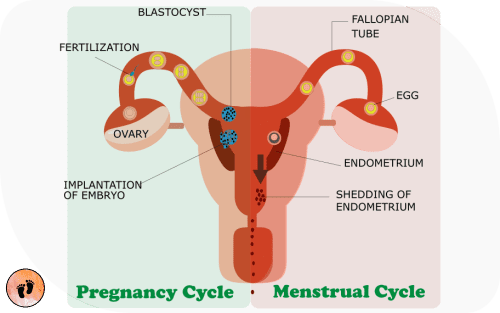Pregnancy: Menstrual cycle, Ovulation & hormones
 Menstrual Cycle versus pregnancy cycle in uterus
Menstrual Cycle versus pregnancy cycle in uterusWhat is the Menstrual Cycle
Menstrual cycle is the hormonal changes that a women body goes through during a month time for a possible pregnancy. The menstrual cycle ranges from the first day of the last period to the first day of the next period. This cycle takes on an average 28 days to complete but can vary from 23-36 days in some women.
Irrespective of your cycle duration the ovulation happens usually 12-16 days before your next period. Knowing when you are ovulating can increase your chances of getting pregnant.
Phases or stages of Menstrual Cycle
There are 4 major stages of menstrual cycle
- Periods (Menstruation)
- Before Ovulation (Or Proliferative phase)
- Ovulation
- After Ovulation (Luteal phase or Secretory phase)
Periods:
The periods or menstruation usually lasts for 3-7 days where the body is shedding the uterus lining (endometrium) which was built in the previous menstrual cycle, to support pregnancy, and prepares the body for next cycle. This process repeats every month.
Before Ovulation:
The ovaries are the organ where the egg matures each month. There are 2 ovaries in women body. The ovaries have many follicles (small sacs) containing so many undeveloped eggs. Every month the hormone which controls the menstrual cycle causes some eggs to mature. Many follicles compete to get the mature egg but usually, only one follicle will be dominant.
Ovulation:
The hormones in our body causes the rupture of the dominant follicle to release the egg from the ovary and travel through the fallopian tube, this process of the release of an egg from ovary is called ovulation.
Meanwhile, the other hormone (estrogen) makes sure the uterus lining is thickening with nutrients. This is to make sure in case you get pregnant the fertilized egg will have enough support & nutrients for growth. The same estrogen makes the cervical mucus thin so that sperm can swim easily through the uterus and survive in it for several days. This can be observed as thin & slippery discharge from vagina during this time of the menstrual cycle.
If you have sex, in a single ejaculation, millions of sperms will be released inside the vagina, from where the sperms will travel up to cervix into the uterus and fallopian tube to finally meet mature egg if present. The average lifespan of sperm is 6 days after that it will die.
It is a general perception that you ovulate on day 14 but that is not entirely true in all cases. The actual ovulation depends on the cycle duration which can vary from one month to others and will be different in different women.
After Ovulation:
The mature egg released in fallopian tube starts to travel towards the uterus. The time mature egg spends in the fallopian tube is 12-24 hour and is the only time when fertilization can happen.
As soon as the egg is released the follicle starts producing another hormone called progesterone which further helps in thickening of uterus line. The hormone level will continue to increase for a few more days which is responsible for Pre-Menstrual Syndrome (PMS) symptoms like tender breast, irritability, bloating, stress, depression etc.
If the sperm is present at the time of ovulation, the sperm will join the egg to give fertilized egg and continue to travel towards the uterus. The egg starts to divide into more and more cells to give a ball-like structure which is called blastocyst. The blastocyst reaches the uterus after 3-4 days and keeps floating for another 2-3 days.
If the blastocyst attaches to the lining of the uterus, it is called implantation and marks the start of pregnancy.
As soon as the implantation happens, the body starts producing pregnancy hormone human chorionic gonadotrophin (hCG) which prevents uterus lining from shedding. This is the reason why people won’t get periods once pregnant.
If sperm is not present, the egg will get reabsorbed in the body. The empty follicle shrinks, the hormone level (estrogen & progesterone) will starts declining and the uterus lining (endometrium) will starts breaking down and shedding. These marks start of your period and start of the next menstrual cycle.
Takeaways:
- The menstrual cycle is the most natural and amazing phenomenon in women’s body.
- Women generally experience the menstrual cycle every month from age ranging from 12 years – 51 years (average).
- Knowing the exact time of ovulation can increase your chances of getting pregnant.
Recent Posts
Homemade Pregnancy Test
How to Prevent Pregnancy Stretch Marks
Is It Safe to Eat Ice Cream During Pregnancy
Breast Pain in Pregnancy
7 Tips to getting pregnant faster
COMMON INFECTIONS DURING PREGNANCY
Pregnancy Diet: Apples during Pregnancy
Advertisement
Duis leo. Donec orci lectus, aliquam ut, faucibus non
Join Our Community of Expecting Parents Today!
Subscribe to get updated on latest and relevant pregnancy-related details